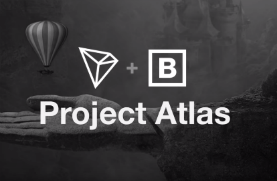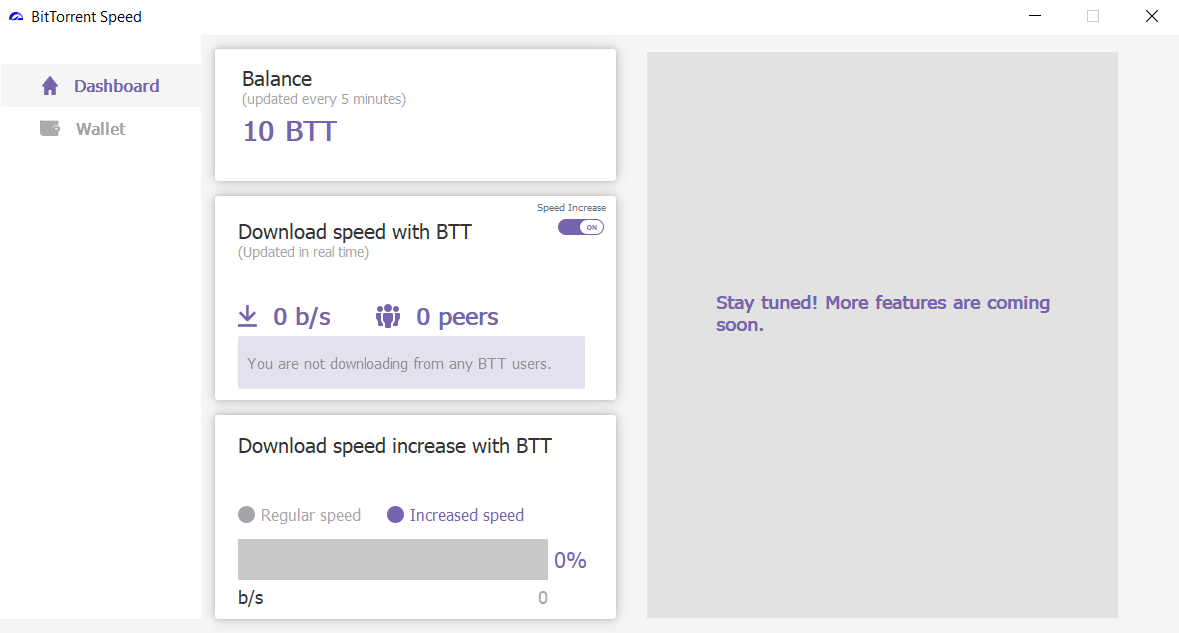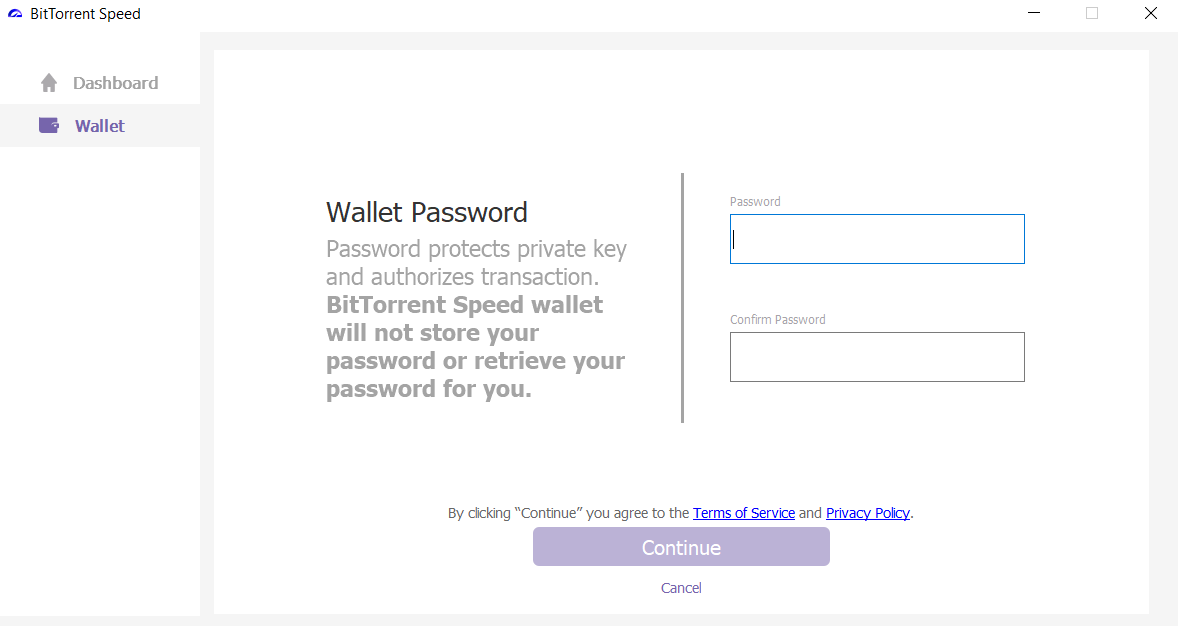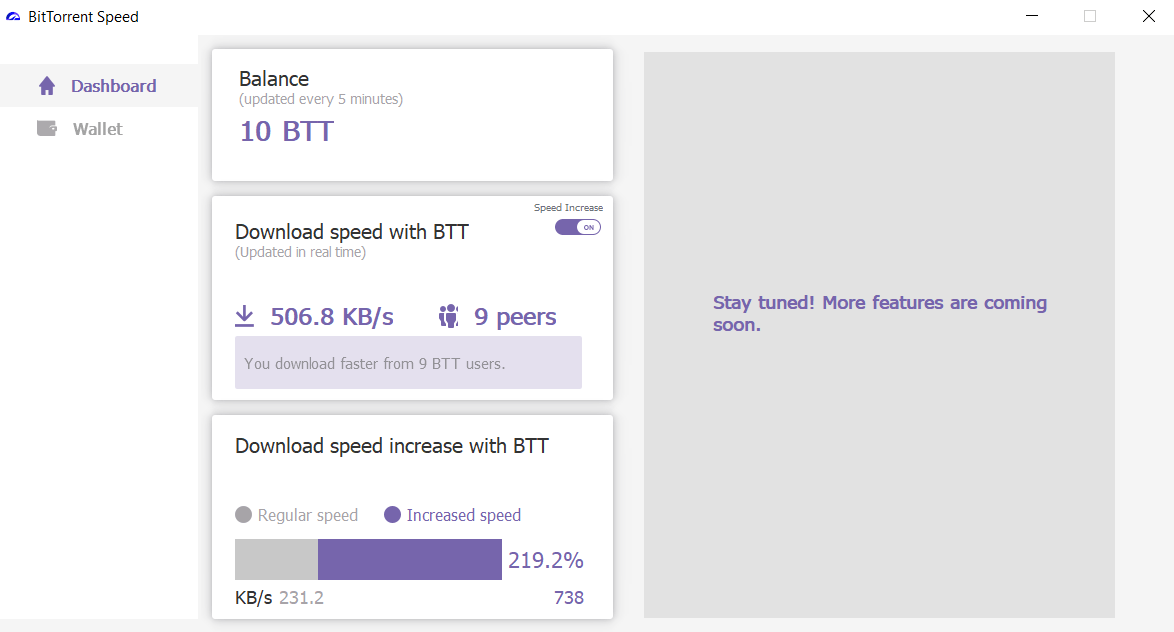
More than a year ago, TF revealed that Justin Sun, founder of cryptocurrency TRON, was planning to buy BitTorrent Inc.
The sale was completed in 2018 and was followed by an announcement this January that the company planned to augment the BitTorrent protocol with a method to speed up downloads using a new token called BTT.
The idea is that people can earn BTT by seeding content for longer, thus providing more bandwidth for the swarm. This bandwidth can then be purchased using BTT by those who want faster downloads.
A few hours ago, BitTorrent Inc. released a new version of the Windows uTorrent client – version 3.5.5 (build 45287) – with an early implementation of the promised features. The interface is largely the same as before but with the inclusion of a BitTorrent Speed button on the left pane. Pressing it reveals the following;

As indicated in the ‘balance’ section, all new users are gifted 10 BTT. An AMA conducted on YouTube by TRON founder and BitTorrent CEO Justin Sun and BitTorrent’s VP of Product Justin Knoll revealed that this was to “bootstrap” BitTorrent Speed. The idea is to reward early adopters and create a little bit of supply so that people are able to use tokens to experience faster downloads.
The next step of the setup is to create a wallet in which to store users’ BTT. The process is very simple indeed and only requires the user to input a secure password.

The process is very straightforward and once complete, it’s then up to the user to load up their uTorrent software with a torrent file of their choice. The fact that BitTorrent Inc. doesn’t get involved in this process was underlined during the AMA, with Knoll indicating that people should simply head off onto the web and find torrents themselves.
Tests shared with TF on a random torrent with several hundred active peers quickly revealed around 9 other peers offering a BitTorrent Speed “boost”, a fact revealed in the dashboard. With the ‘Speed Increase’ toggle turned on, it was claimed that the download was 219.2% faster than usual. Any ‘bidding’ for this claimed additional speed currently takes place automatically.

While the torrent speed would no doubt have gained momentum as more seeds and peers were found, switching the toggle back and forth didn’t seem to make much difference to actual download speeds in the client. Occasionally, pressing the button from off to on did increase the download speed but at times, switching the toggle the other way also had the same effect.
Without longer-term detailed network analysis, it is extremely difficult to see whether any positive fluctuations are a result of BitTorrent Speed or just regular peers and seeds ebbing and flowing as they usually do. For now, the new system can only be taken at face value and even then with caveats.
Certainly, sudden claims in the client that a 25,000%+ speed boost was taking place simply cannot be true, unless it suddenly stopped most transfers and then calculated from there. The fact is that not enough information is currently provided in the client to draw any accurate conclusions.
It’s also worth considering that before this feature was made available, the same bandwidth would have been available in the swarm without discrimination, so the only possible boost for uTorrent users this morning would have been obtained to the detriment of others in the swarm using a different client. Unless people were immediately seeding more.
Nevertheless, this is very early days for the system, something that was underlined in the AMA several times. Indeed, some users may notice that their gifted 10 BTT balance doesn’t seem to change in their client, a point addressed by Knoll.
“You’re probably unlikely to see [your BTT run out] with this early build, you’re more likely to see increased download speeds and a balance that stays approximately the same as when you install it. If you do run out, the way you can refill the wallet is by connecting it to another wallet or seeding torrents,” he explained.
Of course, the big push has surrounded the ability of users to earn BTT for seeding. However, that doesn’t seem particularly likely in the version just released.
“In this early build while we’re still evolving the product and getting a larger and larger userbase of BitTorrent Speed users, you should expect to see much more speed improvements and less earning for seeding,” Knoll said.
“The earnings you can expect depend on a variety of factors. Demand for the file is part of it, how many seeds are already available is part of it. It’s easier to earn if you’re seeding a file where you’re one of a smaller number of seeds than when there’s a lot of users who are trying to download it. You want to be in a file where a lot of wallet users are trying to get it.”
Finding those torrents is currently down to the skill of the user but BitTorrent Inc. suggests that in the future there could be a system that is able to “find files that are under-provisioned” in order to assist those looking to earn tokens.
One of the questions raised in the AMA is whether BitTorrent Speed is anonymous, something that was initially answered by Sun. The quality of his audio on the live stream was particularly weak compared to that of Knoll but he responded as follows;
“Sure, I think BitTorrent Speed isn’t changing anything over our existing product, so for BitTorrent clients and uTorrent clients we don’t collect any people’s name, their data, so we know who they are. So right now BitTorrent Speed is the same, so you can spend (inaudible) your BTT (inaudible) and we don’t have control over your assets and any identity,” he said.
Knoll then chimed in with a more detailed response that more accurately describes what will going on from a technical perspective.
“The BitTorrent protocol, I would say, is not entirely anonymous, in the sense that when you join swarms the other participants in that swarm have knowledge of your IP address. So in designing BitTorrent Speed, we didn’t really change things too much from that point of view.
“The only change being that you connect to another peer and are making a payment to that peer in terms of BTT payment, so there’s additional activity there that didn’t exist in the BitTorrent protocol. Like Justin said, that activity is not connected directly to an email address or other personally identifiable information, it’s just connected to a public key basically, that’s created as part of the BitTorrent Speed creation process.
“If you take it from your Speed wallet and put it on the blockchain, then it becomes subject to the anonymity guarantees of the blockchain which means that things are understood by pseudonyms,” he added.
“So it’s a publicly inspectable ledger and if you tell somebody ‘hey, my public key is XYZ’, then they can go back and look at your entire transaction history and that would start to apply if you take your BTT onto the TRON blockchain and disclose to someone else what your account ID is.”
As mentioned earlier, this implementation of BitTorrent Speed is only available on uTorrent for Windows but there are plans to expand this to Mac and Linux users in the future. Additionally, there’s also a possibility that users of other torrent clients could get involved.
“There are a lot of open source torrent clients that are based on common libraries so if we’re able to get support for BitTorrent Speed into those libraries then you could see support on a number of different clients that are more or less white labels of existing open source torrent libraries,” Knoll said.
Users interested in testing out the new uTorrent can do so here.





